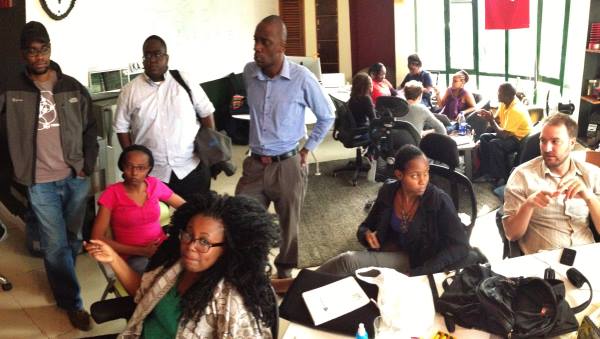Kenya terror attack: Ushahidi develops emergency app
Kenya terror attack: Ushahidi develops emergency app

A terrorist attack on Nairobi’s Westgate mall has prompted Kenyan non-profit crowdsourcing company Ushahidi to develop an application to manage group check-ins during emergencies.
Nairobi-headquartered Ushahidi rose to global prominence in 2007 and 2008 for developing an online crowdsourcing tool that helped tracked post election violence in Kenya.
Fast forward to 2013 and Ushahidi on Monday kick-started development of an open source emergency group check-in app called ‘Ping’.
Development of Ping follows an attack by Somalia-based militant group al Shabaab on Nairobi’s Westgate shopping complex on Saturday, which has left almost 70 people dead and more than 170 injured.
In a bid to better cope with such disasters in future, Ushahidi says users of its Ping app can create a list of people to send check-in messages to when an emergency situation strikes. These messages can be sent via email or SMS, says Ushahidi.
Owners of all phone types then can use the app because the application is mobile-web-based, the co-founder Ushahidi Erik Hersman has explained to ITWeb Africa via Twitter.
Apps such as “I’m OK” already offer a similar service to that of Ping.
But Ushahidi in a blog post says its goal is to make Ping available for basic feature handsets as well. Africa’s smartphone penetration rate stands at just 10% of mobile phone users on the continent, according to Microsoft.
“We’re testing out the SMS side today, almost ready,” Hersman has told ITWeb Africa via Twitter.
“All the code is on Github for everyone/anyone to jump into and make better.
“If someone wants to make a smartphone app for it, that’d be great,” Hersman said.
The Westgate mall attack has also prompted Ushahidi to develop an online crowdsourcing deployment to map all locations of blood drive centres in Kenya, in an effort to match these areas with those willing to help.
Development of technologies such as Ping and the deployment of the blood drive crowdmap are the latest examples of how Kenyans have used tech to assist in disasters.
Apart from Ushahidi’s crowdsourcing efforts during the 2007/8 election violence, the Red Cross in Kenya turned to mobile money in 2011 to help raise funds for the ‘Kenyans for Kenya’ initiative.
This initiative which was launched in response to reports of famine and deaths from starvation in the country’s Turkana District.
And amid the Westgate mall disaster that has unfolded this week, mobile operator Safaricom has also opened zero rated M-Pesa paybill to raise funds for the medical care of the victims.
On Monday, Kennedy Kachwanya, a Kenyan tech entrepreneur, told ITWeb Africa that using technology to help with disaster in Kenya has become ‘normal’ and that it could be regularly used during potential future emergencies.
“I guess people will be more careful when they see something like that because they’ll raise the alarm, and of course the best way to do it now is to spread it through the social media and calling,” Kachwanya told ITWeb Africa.
According to Reuters, the Kenyan government declared that the standoff with al Shabaab militants in Westgate mall on Tuesday. Government has declared three days of mourning, starting on Wednesday.
(Photo courtesy of Erik Hersman.)
